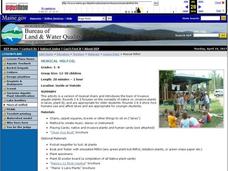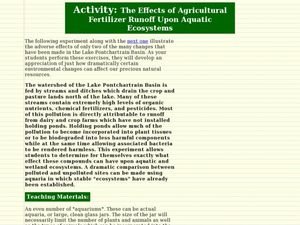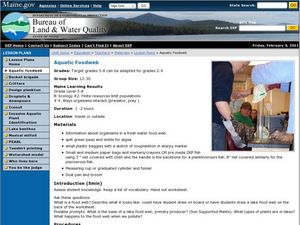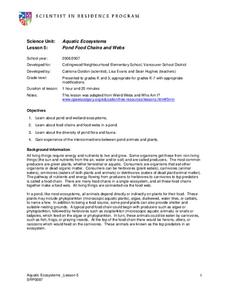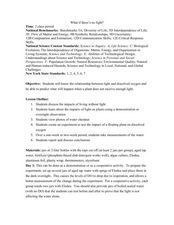Curated OER
Musical Milfoil
Young scholars play a game that is a version of musical chairs to introduce them to invasive aquatic plants. In this aquatic plants lesson plan, students play 4 rounds of this game.
Curated OER
Aquatic Habitat Water Quality Experiment
Fifth graders discuss the importance of water quality for humans and fish and make predictions about what happens to water that is polluted. In small groups, they conduct experiments to compare and contrast water that is unpolluted and...
Curated OER
Water Alchemy
After reading "Aquatic Alchemy," an article about recapturing water for reuse when in space, your class will use calcium hydroxide or hydrated lime to purify cloudy water. Geared toward high school chemistry or environmental science...
Virginia Department of Education
Changes in Ecosystems
How does water pollution affect the environment? Provide your class with the resources to answer this question as they learn about eutrophication and ecosystem changes. Over two weeks, they simulate the effects of pollution on the...
Georgia Aquarium
The Ocean's Nursery
Linear perspective, estuaries, and water ways converge in a science-inspired art project. The class uses what they've learned about eco-systems, estuaries, and the food chain to create scale models of a local marsh. While the lesson is...
Curated OER
Visual Vocabulary
Students interpret and name the vocabulary termed acted out by the mime. In this science/language arts/physical education lesson, students are given a set of vocabulary terms to discuss within their group. Next, students place all...
Baylor College
Bio Build-up
Trace pollutants through the environment in the seventh lesson of this series on the science of food. Looking at a picture of the plants and animals in an aquatic ecosystem, learners use dot stickers to represent harmful chemicals as...
Global Change
Impact of a Changing Climate on the Pacific Walrus
How many of us can say they've seen a Pacific walrus? Not many and one of the reasons is the impact of climate change on their aquatic environment. Children get to think about the food web of the Bering Sea by creating an actual web with...
Curated OER
Turning the Tide on Trash: Marine Debris Curriculum
Six different lessons comprise this unit on marine debris. Science, language arts, social studies, and art projects make this an ideal interdisciplinary unit. The result will be well-informed future citizens who can help make a...
Curated OER
The Effects of Agricultural Fertilizer Runoff Upon Aquatic Ecosystems
Students measure the toxic levels of runoff and discuss the effects it would have on the aquatic system. In this runoff lesson plan, students answer questions to how runoff would affect the animals in an aquatic system.
Curated OER
Aquatic Ecosystems
Ninth graders record information on aquatic ecosystems and create a labeled diagram of an ecosystem of their choice. They can choose from an ocean zone, estuary, river, lakes, or beaches. The student has to explain their biome of choice.
Curated OER
Marine & Aquatic Habitats Activities - Walk in the Wetlands
Students research various types of fresh water wetlands and identify the common animal and plant life in these different ecosystems. They further analyze the need to protect these wetlands and explore their varied uses.
Curated OER
Aquatic Foodweb
Learners explore what a food web is. In this science lesson, students examine how nutrients and other pollutants enter a lake and play a food web game whereby learners pretend they are either zooplankton, planktivore, piscivore, or...
Curated OER
Aquatic Ecosystems
Students study ponds and wetland ecosystems and examine the food chains and webs in them. In this aquatic ecosystems lesson plan students answer questions about the diversity of the flora and fauna in a pond.
Curated OER
Measuring Aquatic pH
Students apply the scientific method and safety rules to aquatic pH. They test unknown solutions for pH levels.
Curated OER
Forest In A Jar
Students conduct an experiment using soil, water, seeds, a plant, and a jar; and then draw a poster to represent their observations and findings. They make a poster showing what happened to their aquatic environment.
Curated OER
What If There's No Light?
students discuss the importance of light and the consequences of living without it. Using a plant as a demonstration, students predict and observe what happens to a plant when it does not receive enough light. In groups, they experiment...
Curated OER
Plants and Air Purity
Learners explore how green plants help improve air quality. They read an article and discuss the importance of air quality and its effects on the human body. They investigate by connecting hose to the top of a Bell jar and to a funnel....
Curated OER
Photosynthesis: Intake of Carbon Dioxide - Production of Oxygen
Students, after a long-term observation of photosynthesis with aquatic plants, assess the benefits of photosynthesis towards all living organisms. They explain in their own words the two cycles within photosynthesis. Guided discussion...
Curated OER
Interconnected Food Web
In this fish worksheet, students make connections between fish and it food and enemies to create a food web. Students label the connections.
Curated OER
Aquatic Investigations
Fifth graders investigate pond organisms, plant life, water temperatures, and changes that occur during the four seasons. They design scavenger hunts with the information collected about pond life. They read about the geology of the...
Curated OER
Plant Lifecycles
Students examine the life cycle of plants. In this plants lesson plan, students identify the various stages of plants and their parts. Students compare the life cycle of a plant with that of an animal. Activities suggested can be...
Curated OER
Weave an Aquatic Food Web
Students explore organisms that are part of interconnected food webs. In this food web lesson, students choose an animal and research what the animal eats. Students begin with the food chain and branch out into the interconnected web...
Curated OER
Marine & Aquatic Habitats Activities - Terrestrial Forests vs. Kelp Forests
Students discuss concept and specificity of habitats, both marine and terrestrial, list similarities and differences in the habitats of a kelp forest and a terrestrial forest, compare types of organisms that occupy corresponding types of...


